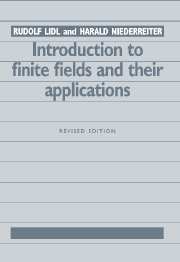Book contents
- Frontmatter
- Contents
- Preface
- Preface to the revised edition
- Chapter 1 Algebraic Foundations
- Chapter 2 Structure of Finite Fields
- Chapter 3 Polynomials over Finite Fields
- Chapter 4 Factorization of Polynomials
- Chapter 5 Exponential Sums
- Chapter 6 Linear Recurring Sequences
- Chapter 7 Theoretical Applications of Finite Fields
- Chapter 8 Algebraic Coding Theory
- Chapter 9 Cryptology
- Chapter 10 Tables
- Bibliography
- List of Symbols
- Index
Chapter 4 - Factorization of Polynomials
Published online by Cambridge University Press: 05 June 2012
- Frontmatter
- Contents
- Preface
- Preface to the revised edition
- Chapter 1 Algebraic Foundations
- Chapter 2 Structure of Finite Fields
- Chapter 3 Polynomials over Finite Fields
- Chapter 4 Factorization of Polynomials
- Chapter 5 Exponential Sums
- Chapter 6 Linear Recurring Sequences
- Chapter 7 Theoretical Applications of Finite Fields
- Chapter 8 Algebraic Coding Theory
- Chapter 9 Cryptology
- Chapter 10 Tables
- Bibliography
- List of Symbols
- Index
Summary
Any nonconstant polynomial over a field can be expressed as a product of irreducible polynomials. In the case of finite fields, some reasonably efficient algorithms can be devised for the actual calculation of the irreducible factors of a given polynomial of positive degree.
The availability of feasible factorization algorithms for polynomials over finite fields is important for coding theory and for the study of linear recurrence relations in finite fields. Beyond the realm of finite fields, there are various computational problems in algebra and number theory that depend in one way or another on the factorization of polynomials over finite fields. We mention the factorization of polynomials over the ring of integers, the determination of the decomposition of rational primes in algebraic number fields, the calculation of the Galois group of an equation over the rationals, and the construction of field extensions.
We shall present several algorithms for the factorization of polynomials over finite fields. The decision on the choice of algorithm for a specific factorization problem usually depends on whether the underlying finite field is “small” or “large.” In Section 1 we describe those algorithms that are better adapted to “small” finite fields and in the next section those that work better for “large” finite fields. Some of these algorithms reduce the problem of factoring polynomials to that of finding the roots of certain other polynomials. Therefore, Section 3 is devoted to the discussion of the latter problem from the computational viewpoint.
- Type
- Chapter
- Information
- Introduction to Finite Fields and their Applications , pp. 132 - 165Publisher: Cambridge University PressPrint publication year: 1994



